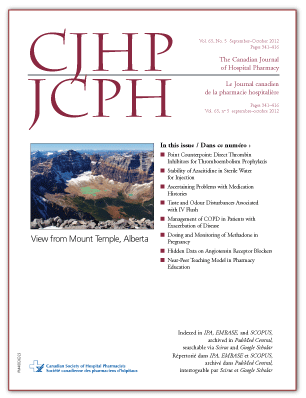Does Outcome Reporting Bias “Cause” Cancer? Risks Associated with Hidden Data on Angiotensin Receptor Blockers
DOI:
https://doi.org/10.4212/cjhp.v65i5.1177Keywords:
outcome reporting bias, meta-analysis, angiotensin receptor blockers, biais de publication des résultats, méta-analyse, antagonistes des récepteurs de l’angiotensineAbstract
ABSTRACT
Conflicting reports have been published regarding the influence of angiotensin receptor blockers (ARBs) on the incidence of cancer. One meta-analysis reported a 1% absolute increase in the incidence of cancer associated with ARBs over 4 years. Contrasting findings were reported in an industry-sponsored meta-analysis and in another meta-analysis, both of which showed no difference in the incidence of cancer in ARB treatment groups relative to control groups. The US Food and Drug Administration has recently asserted that evidence does not support an association between ARBs and the development of cancer. The current review compares the 3 published meta-analyses assessing the association between ARBs and cancer and shows that outcome reporting bias contributed to the conflicting results. Given the prevalence of this form of bias in the scientific literature, the processes for systematic reviews and meta-analyses are under siege, and there is an important role for health care regulators to play. If all outcome data from clinical trials were to be reported in the public domain, independent analyses could be performed and the results of industry-sponsored trials verified. Furthermore, if regulators were to mandate the publication, in the public domain, of all clinical outcomes collected in clinical trials, outcome reporting bias could be eliminated.
RÉSUMÉ
Contexte : Des rapports contradictoires ont été publiés quant à l’influence des antagonistes des récepteurs de l’angiotensine (ARA) sur l’incidence du cancer. Une méta-analyse a signalé une augmentation absolue de 1 % de l’incidence du cancer associée aux ARA sur une période de quatre ans. Des résultats très différents issus de deux méta-analyses, dont l’une a été commanditée par l’industrie, n’ont montré aucune différence dans l’incidence du cancer dans les groupes traités par les ARA comparativement aux groupes témoins. La Food and Drug Administration des États-Unis a déjà affirmé que les données probantes ne corroborent pas le lien entre les ARA et l’apparition de cancer. La présente analyse compare les trois méta-analyses publiées évaluant le lien entre les ARA et le cancer, et montre que les biais de publication des résultats ont contribué à ces conclusions contradictoires. Étant donné la prévalence de cette forme de biais dans la littérature scientifique, la démarche entourant les analyses systématiques et les méta-analyses est sur la sellette et les organismes de réglementation des soins de santé ont un important rôle à jouer dans ce contexte. Si toutes les données issues des études cliniques étaient rendues publiques, des analyses indépendantes pourraient être effectuées et les résultats des études commanditées par l’industrie pourraient être vérifiés. En outre, si les organismes de réglementation exigeaient de rendre publiques l’ensemble des données issues des études cliniques, on pourrait alors éliminer les biais de publication des résultats.
Downloads
Published
Issue
Section
License
Copyright © Canadian Society of Healthcare-Systems Pharmacy.
After publication of a manuscript in the CJHP, the authors of the manuscript must obtain written permission from the CSHP (publications@cshp.ca) before reproducing any text, figures, tables, or illustrations from the work in future works of their own. If a submitted manuscript is declined for publication in the CJHP, all said rights shall revert to the authors. Please note that any forms (e.g., preprinted orders and patient intake forms) used by a specific hospital or other health care facility and included as illustrative material with a manuscript are exempt from this copyright transfer. The CJHP will require a letter from the hospital or health care facility granting permission to publish the document(s).










